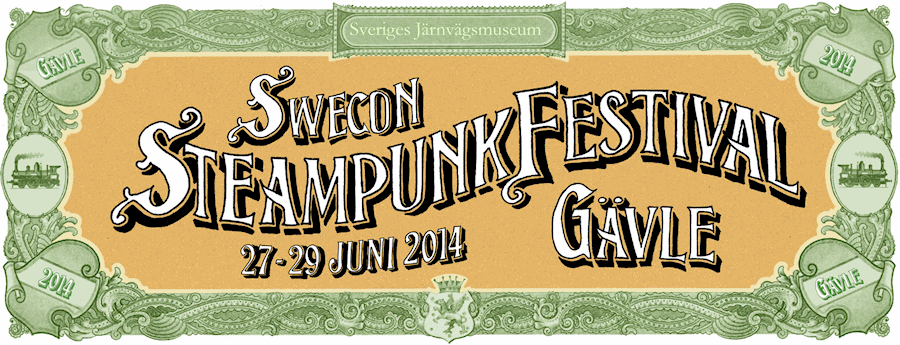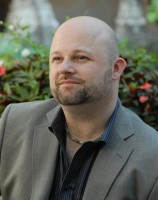Sorry, this entry is only available in Svenska.
Guest Contribution: Steven Savile
Now it’s only a couple of weeks left until the festival starts. There will be amusing discussions, a fantastic ball, a miscellaneous market, and much, much more. The most important aspect, however, are our guest – both you who buys a membership and sits in the audience, and our guests who partly will come a long way in order to participate in discussions and interviews. Round Christmas, we have already presented our guests of honour. Now we would like to continue with Nene Ormes, Elin Holmerin, Karin Tidbeck, Anders Blixt, and Steven Savile. So that there is even more for you to look forward to.
What makes you enthusiastic?
Anyone who knows me well knows I’ve got a few very nerdy loves – one being binge-watching genre tv shows. I was lucky enough to even con a publisher into paying me lots of money to watch tv a few years ago when I was working on Fantastic TV, a big celebration of fifty years worth of television.
The other is football. I’ve been a Spurs fan since I was about 8 or 9 years old, now, coming up 45, they’re by far the longest relationship of my life and are more than capable of hurting me in ways that no one else can because every year I manage to convince myself this time it’ll be different…
The third is technology. I’m obsessed with it. My morning ritual consists of checking out Engadget’s reviews, CNET and clicking every link that promises something new and shiny.
What is the best thing about living in 2014?
I think we’re absolutely living in the best time to be alive, we’ve found cures for so many diseases that only a few generations ago would have threatened us. We understand so much more about the nature and construction of our world and are always looking to push the limits of our understanding.
And we’re so much more connected to the world. Think about it, fifteen years ago a cell phone was pretty much a kilogram brick of plastic with an enormous aerial sticking out of the top of it like some military radio. Now a cell phone is smart. We can walk around with access to the entirety of mankind’s knowledge in our pocket. That’s pretty staggering stuff.
The coffee is also pretty good.
In which fictional world would you like to live, if you had to choose one?
A lot of fictional universes are bloody terrifying… I mean who wants to live in Middle Earth with that whole war going on, or in Osten Ard with the Norns on the march [in the books by Tad Williams /the editor], or in the Star Wars galaxy of clones and mutants and an evil galactic empire? I mean… eeek. But there’s something very romantic about Jonathan Carroll’s novels, especially those opening few, Bones of the Moon, Sleeping in Flame, Land of Laughs, etc, which get called ‘The Answered Prayers’ series. I think I’d like to live in that kind of fantastical world where something magical is possible.
(Svenska) Skrotmarknad!
Sorry, this entry is only available in Svenska.
Archery on Sunday

Gävle Bågskytteklubb (Gävle Archery Club) is a arranging an archery competition on Sunday suring the festival. Entry fee is 20 SEK, or 40 SEK if your need to borrow bow and arrows.
Day: Sunday, June 29th. Place: In front of Hall 6. Time: 12:00 o’clock. You will shoot a series of 30 arrows, 8 participants at a time, ladies and gentlemen together.
They also offer the opportunity to try the long bow yourself for 20 SEK (5 arrows).
If you have questions, contact Elin from GBK: elinsamuel@hotmail.com
Guest contribution: Anders Blixt
Yet another of our invited guests is Anders Blixt, an author, veteran in the world of roleplaying games, and tech writer for a living. If  you would like to get to know him better we strongly recommend his blog, The Dream Forge. He often posts inspiring pictures and links, such as this post linking to our Steampunkfestival! He posts in English, when the topic is not something of particular Swedish interest. Some entry points to his blogging:
you would like to get to know him better we strongly recommend his blog, The Dream Forge. He often posts inspiring pictures and links, such as this post linking to our Steampunkfestival! He posts in English, when the topic is not something of particular Swedish interest. Some entry points to his blogging:
- Review: The Forever Engine, a novel by Frank Chadwick.
- Space 1889: Martian Hyperborea, an example of his RPG writing.
- Midgårdsminnen: MERP på svenska (in Swedish), an example of his writing about Swedish RPG history.
Guest Contribution: Karin Tidbeck
Now it’s only a couple of weeks left until the festival starts. There will be amusing discussions, a fantastic ball, a miscellaneous market, and much, much more. The most important aspect, however, are our guest – both you who buys a membership and sits in the audience, and our guests who partly will come a long way in order to participate in discussions and interviews. Round Christmas, we have already presented our guests of honour. Now we would like to continue with Nene Ormes, Elin Holmerin, Karin Tidbeck, Anders Blixt, and Steven Savile. So that there is even more for you to look forward to.
We are pattern-finders.
I first encountered this fact in the form of ritual and dogma while studing comparative religion and social anthropology at university. It was a simple insight really, very self-evident when you think about it, but it transformed the way I looked at the world. The book that started it all for me was Mary Douglas’ book Purity and Danger, old by now but I think it still holds up well.
But this is old hat: humans are really, really good at finding patterns in nature. It’s vital for survival to be able to quickly sort things into categories: that’s an animal you can cuddle, that one will probably eat you. Those berries are edible, those are poisonous. That person is a member of the flock, that one doesn’t fit in and might hurt you. Very handy. It’s also the function that creates the fear of the Other, the impulse to shun or attack anyone or anything that doesn’t belong to any of your approved categories; it’s the function that helpfully tells you that this person belongs to group X and therefore has Y attributes. Or: this group is good, the other is not-good. The other group, the not-good, is scary. Even more scary are things that will not easily fit into those categories.
Again, old hat to Swedes but a good example: recently a gender-neutral pronoun, hen, popped up in the Swedish vocabulary. Since Swedish doesn’t have a pronoun for situations where a person’s sex is irrelevant, outside of the binary category, or just unknown, this was a very welcome addition. So far so good, yes? But a lot of people went apeshit over this. The two most common arguments were the following: hen is a word for poultry in English (somehow the people who used this as an argument had no problems with other homonyms like fart (speed), slut (end) or barn (child). The other popular argument was that this was all a plot by the feminist mafia to erase gender. Other super scary occurrences are people who don’t fit into the binary gender categories or move between them; people who don’t fit into the stereotypical hetero- or homosexual categories; people who can’t be identified as belonging to a particular “race”; people who don’t quite resemble our image of a “standard human” (I once knew someone who had a phobia of dwarves, for this very reason). It seems difficult to accept that reality is a spectrum rather than a grid.
But this isn’t specifically about gender and sexuality, it’s just the first example I thought of. Other examples: the uncanny valley, or the unsettling area where a doll looks like almost human but not quite. Clowns fit in here too. They look human, but there’s also something else to it: they wear a mask, and you can’t be sure there’s a real person under there. They might be something else, masquerading as humans. I was terrified of Santa as a kid. In Swedish tradition, Christmas presents are handed out by an older family member (usually the father or grandfather) who’s dressed up as Santa. The first time I was old enough to understand what was going on, my grandfather showed up in a Santa mask, and I was terrified. I wouldn’t stop screaming until he took the mask off. Because he looked human, but I wasn’t quite sure that he was. I wasn’t sure those were his eyes behind the mask. (but of course there’s more to masks. Note to self: write about masks, possession and mask play sometime. That also ties in here.)
The food rules in Leviticus? An amazing exercise in sorting animals into categories and shunning those that don’t fit in. If an animal has cloven hooves and chews the cud, it fits into one category; if it chews the cut but doesn’t have cloven hooves, or if it has cloven hooves but doesn’t chew the cud, it falls outside of the category and is shunned. A water-living creature is okay to eat if it has fins and scales, but not if it has scales and not fins, or fins and not scales.
So where am I going with this? I love the in-between categories. It unsettles the hell out of us, and at the same time we’re obsessed with it. I know I am. Much of what I write is about that which falls between the boxes. People who look human but aren’t quite so; voices on the telephone that sound human but you can’t be sure; objects that look like objects but will cease to be so unless you tell them what they are. And amazingly, despite how much I write about it, it still unsettles me. I suppose because my brain, and your brain, is wired this way. A useful but scary-as-hell function when not aware of it, but a playground when you are.
I’m still afraid of Santa masks.
The programme is (almost) done!
 When you organize a convention, the programme is the first thing you think about and the last thing that will be done. The fact that our programme now in fact is quite finished reminds us clearly of that there are only some days – hours, as a matter of fact – left until we can dive into a fantastic world containing steam, punk, books, machines, costumes, and much, much more. During these three days, you will not only be able to participate in discussions and meet wonderful people, but also to listen to panels with out guests Miriam Rosenberg Rocek, Cory Doctorow, Mike Perschon, Chris Wooding, Elin Holmerin, Nene Ormes, Karin Tidbeck, Anders Blixt, and Steven Savile, and on top of that even learn something about zombies, the genderapocalypse or German steampunk, see a costume show, be part of a LARP, do handicrafts, watch how a podcast is recorded, and – last but not least – breathe in the Spirit of Swecon.
When you organize a convention, the programme is the first thing you think about and the last thing that will be done. The fact that our programme now in fact is quite finished reminds us clearly of that there are only some days – hours, as a matter of fact – left until we can dive into a fantastic world containing steam, punk, books, machines, costumes, and much, much more. During these three days, you will not only be able to participate in discussions and meet wonderful people, but also to listen to panels with out guests Miriam Rosenberg Rocek, Cory Doctorow, Mike Perschon, Chris Wooding, Elin Holmerin, Nene Ormes, Karin Tidbeck, Anders Blixt, and Steven Savile, and on top of that even learn something about zombies, the genderapocalypse or German steampunk, see a costume show, be part of a LARP, do handicrafts, watch how a podcast is recorded, and – last but not least – breathe in the Spirit of Swecon.
You can find the whole programme here (mind you: some small changes might be conducted).
(Svenska) Vill du hjälpa till?
Sorry, this entry is only available in Svenska.
June 13th is last day for online registration
This friday, June 13th, is the last day to register online for a festival membership. Registering online is a good thing:
- It is cheaper. A membership costs SEK 400 if you register now, but 550 SEK if you pay at the door.
- Membership is free for those who are younger than 26 old if they register now.
Membership prices at the door will be 550 SEK for the whole festival, or 100 SEK for Friday, 300 SEK for Saturday and 200 SEK for Sunday. (Or 275, 50, 150 och 100 for members who are younger than 26.)
If you want to attend the Steampunk Ball on Saturday night, the last day for buying tickets to the ball is also June 13th.
Guest Contribution: Elin Holmerin
Now it’s only a couple of weeks left until the festival starts. There will be amusing discussions, a fantastic ball, a miscellaneous market, and much, much more. The most important aspect, however, are our guest – both you who buys a membership and sits in the audience, and our guests who partly will come a long way in order to participate in discussions and interviews. Round Christmas, we have already presented our guests of honour. Now we would like to continue with Nene Ormes, Elin Holmerin, Karin Tidbeck, Anders Blixt, and Steven Savile. So that there is even more for you to look forward to.
Elin Holmerin is a writer, graphic designer, editor, mother of two, teacher, and last but not least one of our guests at the Steampunkfestival. I met her in a café at Gamla Stan, an hour before her signing session at Sf-bokhandeln started.
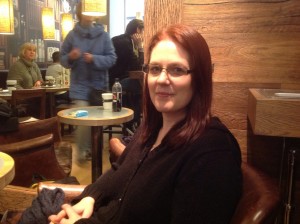 1. Probably, this is not your first autograph session. What was it like when you were invited to have one for the first time? And how does it feel now?
1. Probably, this is not your first autograph session. What was it like when you were invited to have one for the first time? And how does it feel now?
The first time, it was actually me who asked whether I could participate in an autograph session. Back then I was quite nervous. I am always a little nervous, even today. Every writer is. Always. One simply doesn’t know whether people will show up… It’s hard to say how it will turn out.
2. How would it feel if nobody came? Would you continue with your writing, or would you interpret this as a sign of going in a wrong direction?
One must continue then. I know well that there are people out there who buy my books, so even if there was nobody who came… At one’s first signing, even well-known people have to wait for some hours. At my first signing, there came between four and six people, which I thought was very sad, while the book seller thought this very good. Even if you’re feeling disappointed or sorry: just keep on writing.
3. You have founded a publishing house called “Undrentide”. What does it mean?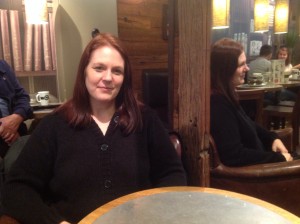
It’s an old English word that stands for the time after lunch. I have read a tale about a queen who eats lunch and then lies down in a grove and falls asleep. When she gets up again, she has gone mad. People were afraid they would go insane if they slept after lunch. So basically, “Undrentide” means “Lunchtime”.
4. As a publisher, you work quite a lot with other people’s texts; has this had an influence on your own writing?
Yes and no. As a matter of fact, I have not written for quite a long time, my last book “Sår” was published in 2012, so it’s quite hard to anticipate how it will be. But one is influenced of course, one gets new inspirations, thinks “Sure, you can do it this way!” The biggest influence, however, is that I concentrate more on grammar, diction, such details. Otherwise, one comes into a bad state. It is hard to read finished books. When I was writing my own books, I was reading less, although this was most because I lacked time.
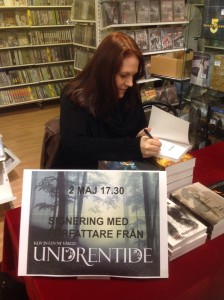 5. Your first book was published with another publishing house, while you published the second and third one yourself.
5. Your first book was published with another publishing house, while you published the second and third one yourself.
Yes. It felt safer, I have more control of my own. My father is a graphic designer, so he took care of the outer form. But being your own publisher also bears a certain uncertainty; one becomes blind for one’s own text. Small mistakes and so on. But it’s still better to be on your own. When my first book was published, there was no one who informed me “this is happening now” and so on. It’s not great not to get answers.
6. Which criteria does a book need to fulfill in order for you to publish it? What is a good book according to you?
It must have something that sticks with you: interesting story, language, something. It’s also good if it stands a little bit outside the traditional fantasy genre, outside the cliché. Outside the standard.
7. What three books by other writers are or have been important for you?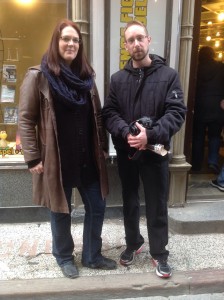
I like classics. Wuthering Heights has been with me for a long time. Though I don’t know whether I would like it if I read it again today. Furthermore, I like Terry Pratchett’s books. They werethe first fantasy books I read. I think I started with “Eric”, although it is not the first one in the series. They are so mad, you can do whatever you want in them. A third author… There is a Vietnamese author, Nguyen Huy Thiep, who writes magic realism. When one reads his books, they seem so commonplace, but there are elements in them that make one think: ”But, wait…”
8. Do you write on your computer or by hand?
I write the first sketch by hand, onto such A5-booklets you use in school. I like to write in bed – draft first chaotic sketches without any system at all, scenes as they come up. I arrange them later on. Typing them on my computer is only a second step.
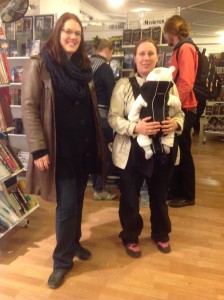 9. You have said in another interview that your books’ origins lie in Swedish myths. How important is Sweden and its historical and cultural heritage for you as a writer?
9. You have said in another interview that your books’ origins lie in Swedish myths. How important is Sweden and its historical and cultural heritage for you as a writer?
Very much. It feels like a huge treasure fo gold which is quite unknown generally. There is so much popular belief and old myths one could make much more of. But it comes gradually. I think Kristina Hård is one of the most recent ones, she uses trolls. All kinds of old histories, Babylonian myths, Chinese stories, are exciting. It’s less about it being Swedish than about it being old.
10. What book took you most time to write?
The first book, “Eldfloder”, took me most time to write because it was so unfamiliar. I hadn’t written that way before. I have always written, short stories, school exercises, just for the fun. At first, it was supposed to become a novella, and then I continued, and the guy I was working with thought, that it was too short, that I should write more. It took me three years. There are noticeable differences between the language of the first and the final sketch. I think it would differ as well if I wrote it today. Actually, there are plans to redact “Eldfloder” and edit a new edition in my own publishing house. At first I thought it might be a good idea to do it for Swecon, but now this seems to be quite unrealistic. I might well take some more years.
11. What do you do if you don’t work or do something job-related?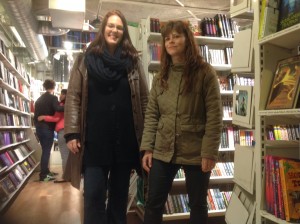
I like computer games, fantasy games to be more precise. The majority of my spare time is dedicated to my publishing house, but of course I also enjoy being with my family.
12. What is your favourite place in Sweden?
The woods. All kinds of woods. Dark and mossy woods.
